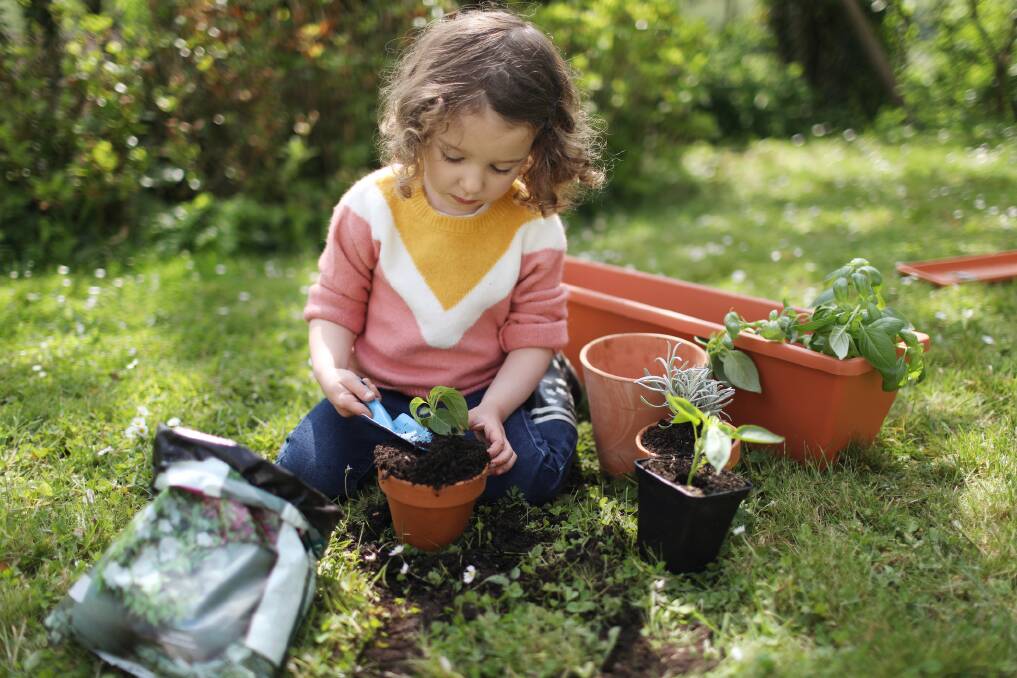
During these periods when some families are spending so much more time at home, it's important to ensure our kids have a balanced amount of time indoors and outdoors, engaging in new and interesting activities.
Subscribe now for unlimited access.
$0/
(min cost $0)
or signup to continue reading
A great way to do this at home is to get your kids involved in gardening. They'll have the opportunity to learn new skills, develop a new hobby and spend quality time outside, away from screens.
If your garden is currently in a state of disarray, consider using a service directory such as hipages to find a professional gardener who can tidy up your yard, so you have a good base to work from. Then you can manage general upkeep as a family.
Here are tips from John McMillan, gardener at General Lawns and Landscapes, to get your kids involved in gardening and turn them into a gardener for life!
Give your kids input. One of the best ways to get your kids involved in gardening is to give them plenty of input into everything that happens. Ask them what kind of plants that they would like to grow and involve them in the garden design. Do they want to plant their plants to spell out a special word or to grow into a certain shape? This is an opportunity for your child to unleash their creativity and imagination. Allowing your kids to have a say in what happens in the garden will make them feel more involved and excited about gardening in general.
Give them their own area. Kids love to have a sense of responsibility and ownership and one of the best ways to do that is to give your kids their very own area of the garden. This could be a garden bed or even just a few containers that belong to them. Make sure that these are at a kid friendly height and easily accessible so they're able to see and tend to their plants easily.
Create a fairy garden. Create magic in your garden for your young ones by building their own fairy garden. This can be created with items salvaged from the backyard. Keep an eye out for fairy garden friendly props (such as mini figurines and plastic toys) at your local op shop too.
Let them get dirty. Gardening is a hands-on activity, which means they're likely to get dirty, and that's okay. Ensure they have gloves for their hands and wear old clothes that can get messy. Especially now we are heading into spring, sun safety is important when working outdoors, so ensure everyone is wearing sunscreen and a hat.
Choose easy to grow plants. Gardening requires patience, something that even adults can struggle with, let alone children. To keep your kids interested in the garden, choose plants that are hardy and easy to grow like natives or succulents. Even better are plants that flower profusely such as daisies, as kids will get very excited when they see the buds forming. Some other great flowers to consider include sunflowers and nasturtiums.
Grow something edible. Fruit and veggies are also great to grow as this will help you teach them about different kinds of foods and herbs, and how these can be used in meals. Some to consider include lettuce, snow peas, beans, potatoes and pumpkin.
Grow grass heads. Do you remember growing grass heads or sprout heads when you were a child? This is a lovely activity to tackle with your kids. They'll have a lot of fun adding character to their critters (and giving them funny haircuts). This activity is also perfect for apartment dwellers who don't have access to backyards or balcony gardens.
Study the outdoors. Grab some pencils and paper and head outdoors for a nature study together. Notice the shapes and colours of plants and ask your kids to draw their favourite flowers and plants. Create a journal of all the notes and continue to add to them over time.
Make it part of their routine. Keep your kids engaged by making gardening part of the daily routine. This could be as simple as watering their plants once a day, maybe after breakfast or in the late afternoon. Tracking the progress of the plants they grow will also keep them excited for each milestone of their plants' life cycle.
Dine alfresco. What better way to appreciate your garden than to have dinner there or enjoy a backyard picnic lunch? You can take this next-level by eating things you've grown in the garden, or eating those you'd like to grow and discuss where you might plant your own delicious veggies.

